Summary | Excerpt | Reviews | Beyond the Book | Read-Alikes | Genres & Themes | Author Bio
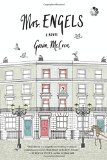
Critics' Opinion:
Readers' Opinion:
First Published:
Oct 2015, 368 pages
Paperback:
Oct 2015, 368 pages
 Book Reviewed by:
Book Reviewed by:
Kate Braithwaite
Buy This Book
This article relates to Mrs. Engels
In Mrs. Engels, Gavin McCrea brings the families of Friedrich Engels and Karl Marx to life, pitching the reader into the action with little biographical backstory. The lives of these characters are interesting to learn about, within and beyond the time span covered in the novel.
Karl Marx and Friedrich Engels
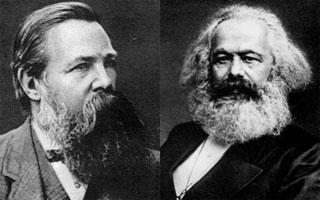 Friedrich Engels (1820-1895) and Karl Marx (1818-1183) were both born in the Rhine Province, then part of Prussia, and collaborated in the 1840s after meeting, for the second time, in Paris. One of the cornerstones of their partnership, The Communist Manifesto, was published in 1848, and asserted that human history consistently showed a struggle between the working classes or proletariat and the owners and producers or bourgeoisie. Marx and Engels called for a future where socialism and communism would triumph over capitalism. Because of his radical views, Marx was expelled first by the French and then also the Belgian governments. For the rest of his life Marx lived as an exile with his family in London.
Friedrich Engels (1820-1895) and Karl Marx (1818-1183) were both born in the Rhine Province, then part of Prussia, and collaborated in the 1840s after meeting, for the second time, in Paris. One of the cornerstones of their partnership, The Communist Manifesto, was published in 1848, and asserted that human history consistently showed a struggle between the working classes or proletariat and the owners and producers or bourgeoisie. Marx and Engels called for a future where socialism and communism would triumph over capitalism. Because of his radical views, Marx was expelled first by the French and then also the Belgian governments. For the rest of his life Marx lived as an exile with his family in London.
Engels traveled to Manchester, where his successful running of his family's cotton mill provided funds that allowed him to financially support the Marx family.
Engels credited the majority of the original thinking and theorizing behind their work to Marx, declaring that "Marx was a genius; we others were at best talented," but many commentators believe that without Engels' financial support and encouragement, as well as his journalistic skills, Marx would not have been able to develop his ideas as fully or disseminate them as he did. After Marx's death, Engels continued to support the Marxist cause, editing the second and third volumes of Das Kapital.
Mary and Lizzie Burns
Although little biographical information is known about the Burns sisters, it seems likely that in the 1840s Friedrich Engels met Mary Burns, and her sister Lizzie, working in Ermen & Engels, a factory producing cotton thread in Manchester. Mary is credited with introducing Engels to the realities of working class life in the city at a time when the average life expectancy was 28 years. After Mary's death in 1863, Engels and Lizzie moved to London and their time there is explored through fiction in Mrs. Engels.
Jenny von Westphalen
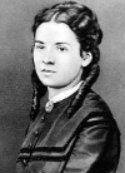 Jenny von Westphalen (1814-1881) married Karl Marx after a seven-year engagement and in the face of her aristocratic family's clear disapproval. They had seven children together of whom only three survived into adulthood. Jenny and Marx were forced to move around Europe and endure times of real poverty and persecution because of Marx's work. Throughout their lives they were financially and emotionally supported by Friedrich Engels. Von Westphalen's importance in the life and work of Karl Marx is the subject of Love and Capital by Mary Gabriel which was nominated for a National Book Award for nonfiction in 2011.
Jenny von Westphalen (1814-1881) married Karl Marx after a seven-year engagement and in the face of her aristocratic family's clear disapproval. They had seven children together of whom only three survived into adulthood. Jenny and Marx were forced to move around Europe and endure times of real poverty and persecution because of Marx's work. Throughout their lives they were financially and emotionally supported by Friedrich Engels. Von Westphalen's importance in the life and work of Karl Marx is the subject of Love and Capital by Mary Gabriel which was nominated for a National Book Award for nonfiction in 2011.
The Marx's children
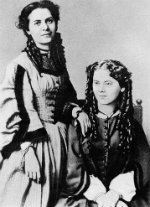 The three children of Karl and Jenny Marx to survive to adulthood were all called Jenny: Jenny Caroline, Jenny Laura and Jenny Eleanor.
The three children of Karl and Jenny Marx to survive to adulthood were all called Jenny: Jenny Caroline, Jenny Laura and Jenny Eleanor.
Jenny Caroline was a social activist and writer who married the French communist Charles Longuet. The family was devastated when she died of bladder cancer aged 38.
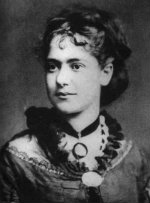 The middle sister, Jenny Laura, also married a Frenchman, the socialist Paul Lafargue whom she met through her father's work. Laura Marx and Lafargue worked to promote socialism throughout Europe and in 1911 jointly committed suicide to avoid burdening others with their old age.
The middle sister, Jenny Laura, also married a Frenchman, the socialist Paul Lafargue whom she met through her father's work. Laura Marx and Lafargue worked to promote socialism throughout Europe and in 1911 jointly committed suicide to avoid burdening others with their old age.
The youngest daughter Jenny Eleanor (known as Tussy) was a tireless writer and speaker, advocating women's rights and co-authoring The Woman Question (1886). Sadly aged 43, Tussy also committed suicide, allegedly because she had discovered that her lover had secretly married an actress.
Pictures from Marxists.org
Filed under People, Eras & Events
![]() This article relates to Mrs. Engels.
It first ran in the October 21, 2015
issue of BookBrowse Recommends.
This article relates to Mrs. Engels.
It first ran in the October 21, 2015
issue of BookBrowse Recommends.





The Flower Sisters
by Michelle Collins Anderson
From the new Fannie Flagg of the Ozarks, a richly-woven story of family, forgiveness, and reinvention.

The House on Biscayne Bay
by Chanel Cleeton
As death stalks a gothic mansion in Miami, the lives of two women intertwine as the past and present collide.

The Funeral Cryer by Wenyan Lu
Debut novelist Wenyan Lu brings us this witty yet profound story about one woman's midlife reawakening in contemporary rural China.
Your guide toexceptional books
BookBrowse seeks out and recommends the best in contemporary fiction and nonfiction—books that not only engage and entertain but also deepen our understanding of ourselves and the world around us.